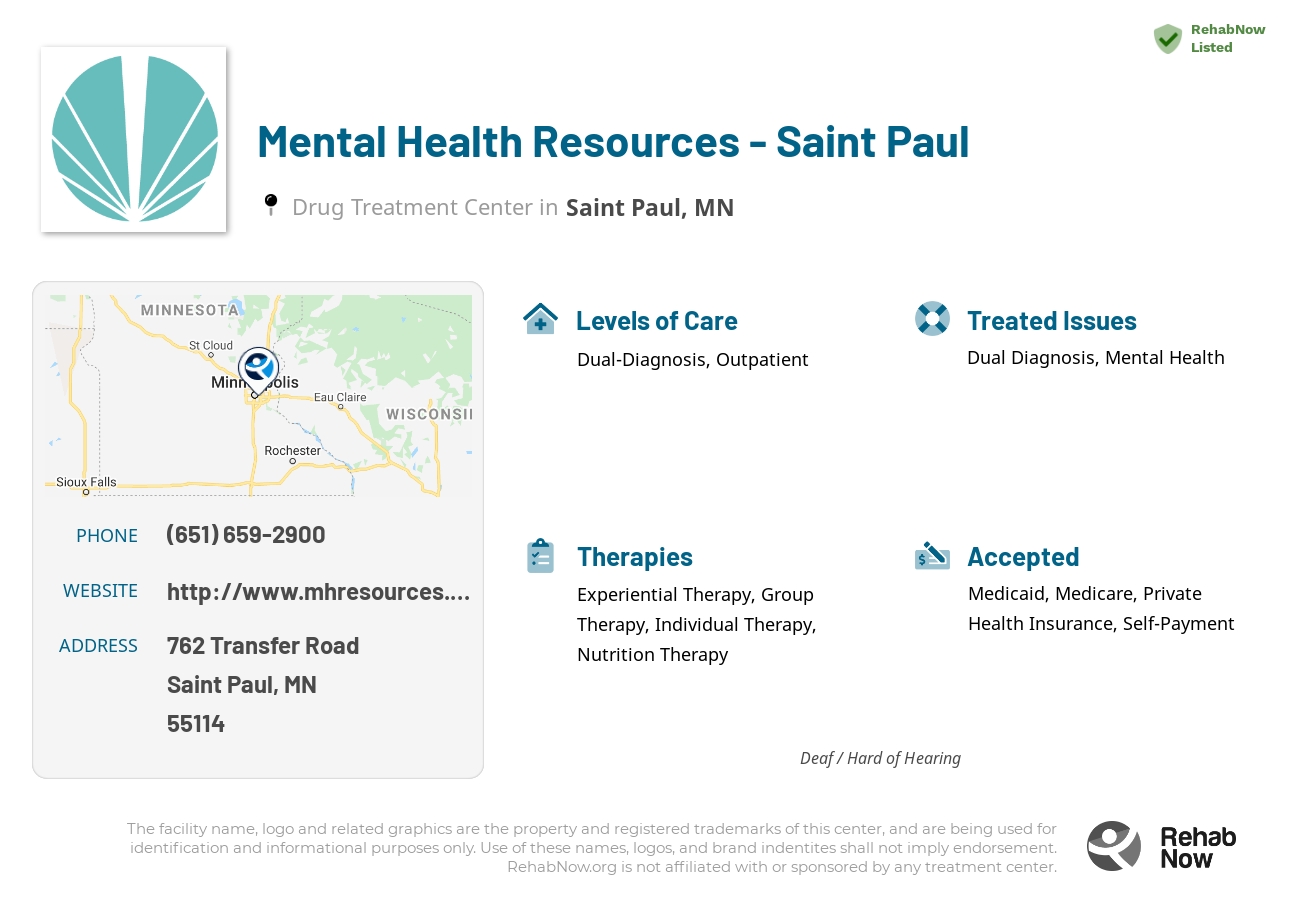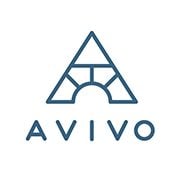
Mental Health Resources - Saint Paul
Drug Rehab Center in Saint Paul, Minnesota
- Mental Health
- Dual Diagnosis
Mental Health Resources - Saint Paul is a nonprofit organization that offers a variety of behavioral health services, including addiction and substance abuse treatment, and has received numerous accreditations and awards for their commitment to providing quality mental health services.
About This Minnesota Facility
Mental Health Resources - Saint Paul is a nonprofit organization in Saint Paul, Minnesota that provides a variety of behavioral health services for adolescents and adults. This facility focuses on providing resources for mental health issues, addiction, substance abuse, and family issues. At Mental Health Resources - Saint Paul, they believe that therapeutic care is vital to achieving a healthier life, so they prioritize offering compassionate and evidence-based treatment.
Mental Health Resources - Saint Paul offers multiple programs to treat individuals with substance use disorder and addiction. For example, they provide day treatment, an Intensive Outpatient Program (IOP), trauma-informed care, individual sessions, group therapy, and family counseling sessions. In addition, they also provide medication-assisted treatment, which is a comprehensive approach to addiction treatment that includes a combination of medical and behavioral therapies.
Mental Health Resources - Saint Paul has a passion for helping individuals and families in need and as such, has received numerous accreditations, licenses, and awards. They have been accredited by The Joint Commission, given a Gold Seal by the Center for Medicare and Medicaid Services, and have been nationally recognized by the Commission on Accreditation of Rehabilitation Facilities. In addition, Mental Health Resources - Saint Paul has received multiple awards for their commitment to providing quality mental health services, such as the National Council for Behavioral Health Quality Award.
Genders
Ages
Modality
Additional
Conditions and Issues Treated
There are different kinds of Dual Diagnosis:. A person who simultaneously experiences both a mental illness and an addiction disorder. Or, a person who experiences one or more coexisting (simultaneous) mental health conditions in addition to a primary substance use disorder.
The treatment requires a multi-disciplinary approach, it’s crucial for individuals to partner up with a healthcare provider who understands all the recovery components.
Levels of Care Offered at Mental Health Resources - Saint Paul
This center offers a variety of custom treatment tailored to individual recovery. Currently available are Dual-Diagnosis, Outpatient, with additional therapies available as listed below.
The outpatient programs in Saint Paul, MN are for those addicted drugs or alcohol. The goal of the outpatient rehabilitation program is to make them stop abusing drugs or alcohol, reduce drug use or addictive behaviors, and become entirely sober. It is generally required to attend the outpatient program for 10-12 hours every week.
Patients can be administered on-the-spot medication to ease withdrawal symptoms such as anxiety, increased heart rate, and even depression. Groups such as Alcoholics Anonymous (AA) and Narcotics Anonymous (NA) can be used as a part of outpatient treatment to help maintain sobriety.
Therapies & Programs
People in addiction recovery can benefit from individual therapy. This type of therapy involves meeting with a therapist one-on-one. This allows for a personal and trusting relationship to be built so that the patient can be truly themselves and express any emotions they feel. Individual therapy leads to greater understanding and peace about your triggers for addiction and coping strategies to prevent relapse.
Group therapy sessions are held in rehab facilities, clinics, churches or community centers that offer drug addiction treatment. People who attend these groups are encouraged to voice their feelings and support other addicts in recovery. This helps group members strengthen their own recovery program while cheering on others who are struggling with sobriety.
Group therapy sessions provide recovering addicts with a chance to cope with everyday situations that many face. Group therapy sessions are held in rehab facilities, clinics, churches or community centers that offer drug addiction treatment.
People who attend these groups are encouraged to voice their feelings and support other addicts in recovery. This helps group members strengthen their own recovery program while cheering on others who are struggling with sobriety.
Cognitive Behavioral Therapy (CBT) helps addicts identify faulty, negative thinking so that they can work together with the therapist to find healthier ways of thinking. CBT focuses on specific aspects of each person’s thinking, feeling, physiology, and behavior. It aims to identify specific problems in these areas, and create a personalized treatment strategy.
Addicts often experience intense cravings for sugary foods during recovery. By teaching addicts how to eat well and stay healthy, therapists can help them manage their cravings over the course of treatment.
During these sessions, Saint Paul, Minnesota dietitians and therapists will offer advice about healthy eating options and teach addicts how to make specific changes in their diet that can help reduce the effects of cravings during recovery.This type of therapy is often used in conjunction with other types of addiction treatment services. By identifying specific triggers and developing strategies to help addicts avoid relapse, most individuals can overcome their cravings and stay sober for good after they finish rehab.
The first step to becoming a non-smoker is the choice to quit smoking. Nicotine replacement therapies are effective because they provide you with the nicotine you are addicted to without inhaling carcinogens from cigarettes.
There are several types of NRT. These include:
- Nicotine gum
- Nicotine patches (transdermal systems)
- Nasal spray
- Lozenges
The benefits to using NRT can include:
- Reduce the risk of heart disease and cancer
- Reduce the anxiety and irritability associated with quitting smoking
- Reduce the risk of type II diabetes.
- Improved fertility in women
Patient Experience
Experiential Therapy at Mental Health Resources - Saint Paul
Experiential Therapy allows addicts to release emotions in a safe environment. The process involves addicts painting their feelings and releasing them on a canvas. LPE – Love, Peace, and Equilibrium is one of the most popular forms of experiential therapy.
Payment Options Accepted
For specific insurance or payment methods please contact us.
Is your insurance accepted?
Ask an expert, call (888) 674-0062
Mental Health Resources Associated Centers
Discover treatment facilities under the same provider.
Learn More About Mental Health Resources Centers
Additional Details
Specifics, location, and helpful extra information.
Saint Paul, Minnesota 55114 Phone Number(651) 659-2900 Meta DetailsUpdated November 25, 2023
Staff Verified
Patient Reviews
There are no reviews yet. Be the first one to write one.
Saint Paul, Minnesota Addiction Information
Minnesota is fighting an opioid epidemic that is leaving hundreds of its residents dead each year. Both prescription opioids and illicit opioids are widely abused in the Land of 10,000 Lakes. Heroin continues to be one of the most commonly abused drugs in the state, if not the most common illicit drug. Over 10% of all treatment admissions in Minnesota list heroin as their drug of choice.
Methamphetamine use has led to increased crime in Saint Paul, MN. There were 1,497 drug-related crimes in Saint Paul in 2017. This number represents a 9% increase from the previous year. The community has been hit hard by the opioid epidemic as well. The greatest way to locate the finest rehabilitation facility in Saint Paul, Minnesota, is to inquire about it by talking with your friends, family, and coworkers.
Treatment in Nearby Cities
- Little Falls, MN (90.8 mi.)
- Ogema, MN (197.9 mi.)
- Rush City, MN (51.0 mi.)
- Sawyer, MN (121.0 mi.)
- Albert Lea, MN (91.5 mi.)
Centers near Mental Health Resources - Saint Paul



The facility name, logo and brand are the property and registered trademarks of Mental Health Resources - Saint Paul, and are being used for identification and informational purposes only. Use of these names, logos and brands shall not imply endorsement. RehabNow.org is not affiliated with or sponsored by Mental Health Resources - Saint Paul.





